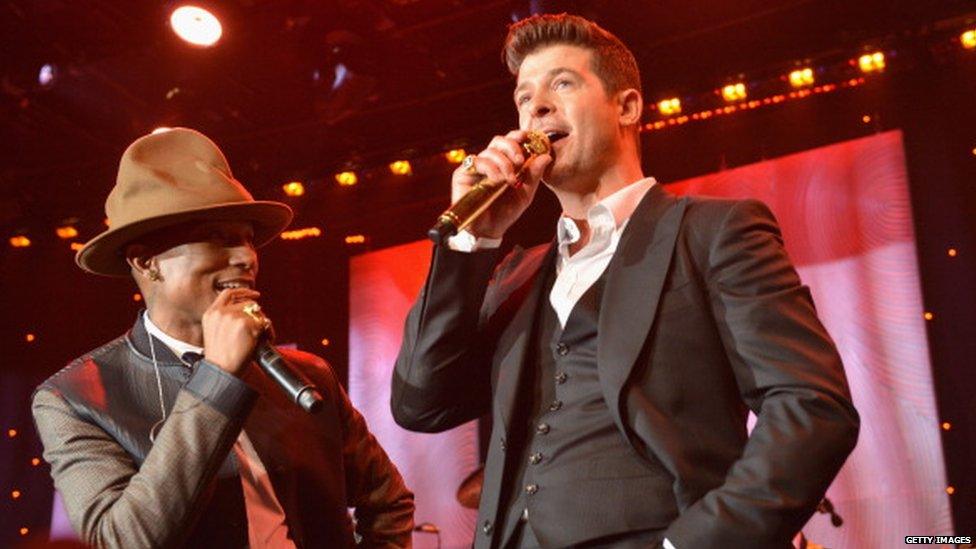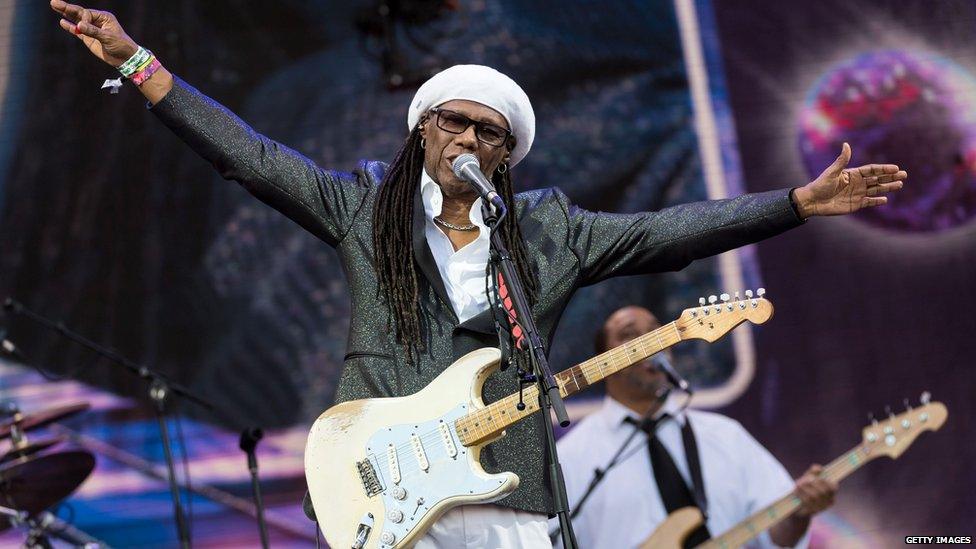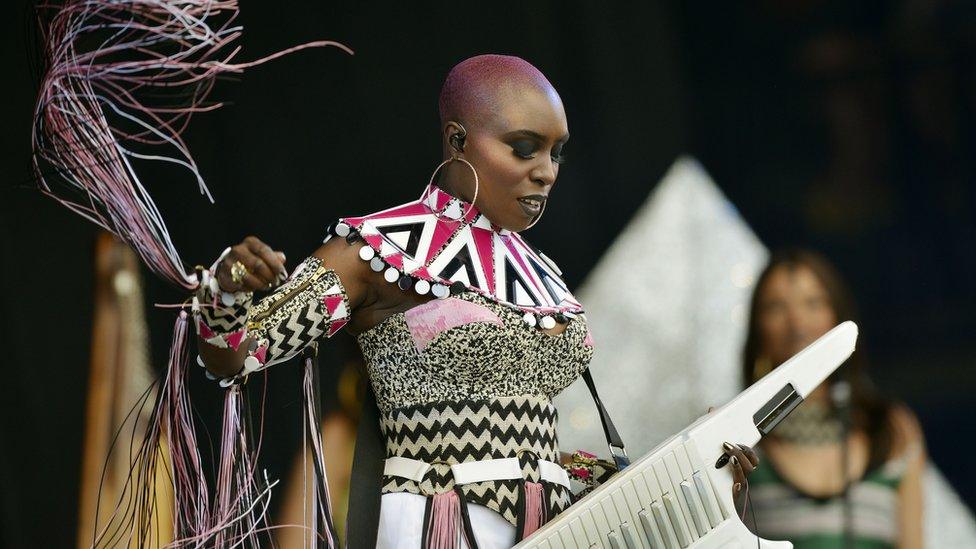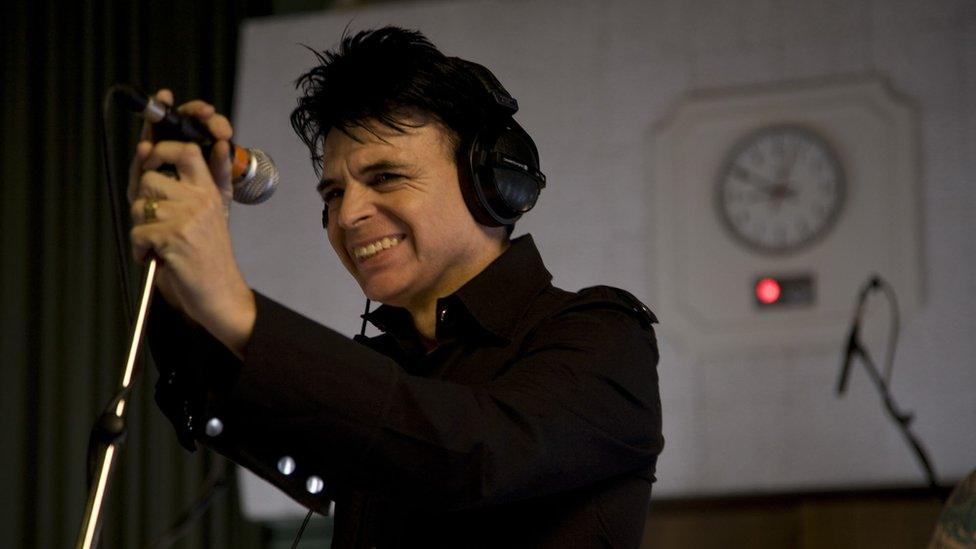Is the threat of a copyright lawsuit stifling music?
- Published

Blurred Lines made more than $5m (£3m) for Pharrell Williams (left) and Robin Thicke
Artists are being advised not to state publicly who they're inspired by on their new music, the Victoria Derbyshire programme has learned. Could this stifle their creativity?
"There is no such thing as a completely original composition," says music producer and songwriter Nile Rodgers.
"We learn music by practising. And what do we practise? We practise patterns. We practise scales.
"The art of music-making is the reinterpretation of those rules that we learned."
You would be hard-pushed to find a musician in the charts whose work hasn't taken inspiration from their idols and contemporaries.
Now though, music experts have told the Victoria Derbyshire programme that artists are being advised not to mention publicly who has inspired them.
This is because of a high-profile copyright infringement case in which US jurors ruled that Robin Thicke and Pharrell Williams, on their song Blurred Lines, had copied Marvin Gaye's Got To Give It Up.
The Gaye family estate was awarded $7.3m (£4.8m) in damages, although an appeal has since been launched.

The verdict sent reverberations around the industry, with particular attention being paid to the fact that in court Pharrell Williams said Marvin Gaye's music was part of the soundtrack of his youth, and that he was "channelling... that late 70s feeling" in Blurred Lines.
According to forensic musicologist Peter Oxendale "everyone's concerned that inspiration can [now be interpreted as] a catalyst for infringement.
"All of these companies are worried that if a track is referenced on another at all, there may be a claim being brought," he explains.
Mr Oxendale says some artists are now having the requirement to name their influences written into contracts by their record labels - although he would not specify names.
"Many of the companies that I work with ask the producers and the artists to declare all of the tracks that may have been used as inspiration for their new tracks," he says.
He also confirmed that he is being sent new music to check the possibility of future copyright infringement claims.
'Sued for whistling'
But Richard Busch, the lawyer working on behalf of the some Marvin Gaye family members, says the industry has misunderstood the reasons why the Blurred Lines ruling was made, and that the judgement was not based on the "feel" or the "groove" of the song, as has been claimed.
"That's the story the Pharrell and Robin Thicke camp have been telling to try to drum up support. This 'the sky is falling', 'no-one is going to be able to create music', 'you'll be sued for whistling in public' - it's just not true.
"If anyone was actually aware of the evidence and the facts that they presented, you'll know it went far beyond that.
"In fact, I believe we had 15 different compositional elements that we identified as being significantly similar between Blurred Lines and Got To Give It Up."

Nevertheless, Simon Dixon - one of the lawyers for Ed Sheeran, Sir Elton John and the Rolling Stones - says the judgement has made some people in the industry nervous.
"[The court case] wouldn't have been decided the same way over here [in the UK]," he explains.
"So as a result, everyone felt they knew what the law was, they knew what the parameters were.
"And when you know what the laws are and the rules are you get comfortable. This injects an element of grey into the picture.
"So as a result people are less certain now about what they can and can't do. And as a result, everybody feels a bit nervous."
For singer-songwriter Laura Mvula, however, if a musician is looking to create their own original material, the ruling should not be a concern.
"We're all inspired by something, there are influences in everything," she says.
"But I just think the responsibility of the songwriter is always to push forward."

Fellow singer-songwriter Gary Numan believes it is just a case of musicians ensuring that influences are used to progress their own work.
"We all listen to stuff and we all get ideas from the things we listen to. And the trick of it is to turn those ideas into something new rather than just repeat them or copy them.
"Every fire starts with a spark, every song starts with an idea.
"You're influenced simply by listening to music. Even if you don't like the music, it's going to have some impact on what you do."
In just over two months' time, the Gaye family, Robin Thicke and Pharrell Williams will be back in court as the appeal process begins.
The Blurred Lines singers will be hoping they will be successful this time around.
But whatever the verdict, the industry is likely to remain extremely wary about copyright when it comes to releasing new music.
Watch the Victoria Derbyshire programme on weekdays between 09:00 and 11:00 on BBC Two and the BBC News channel.